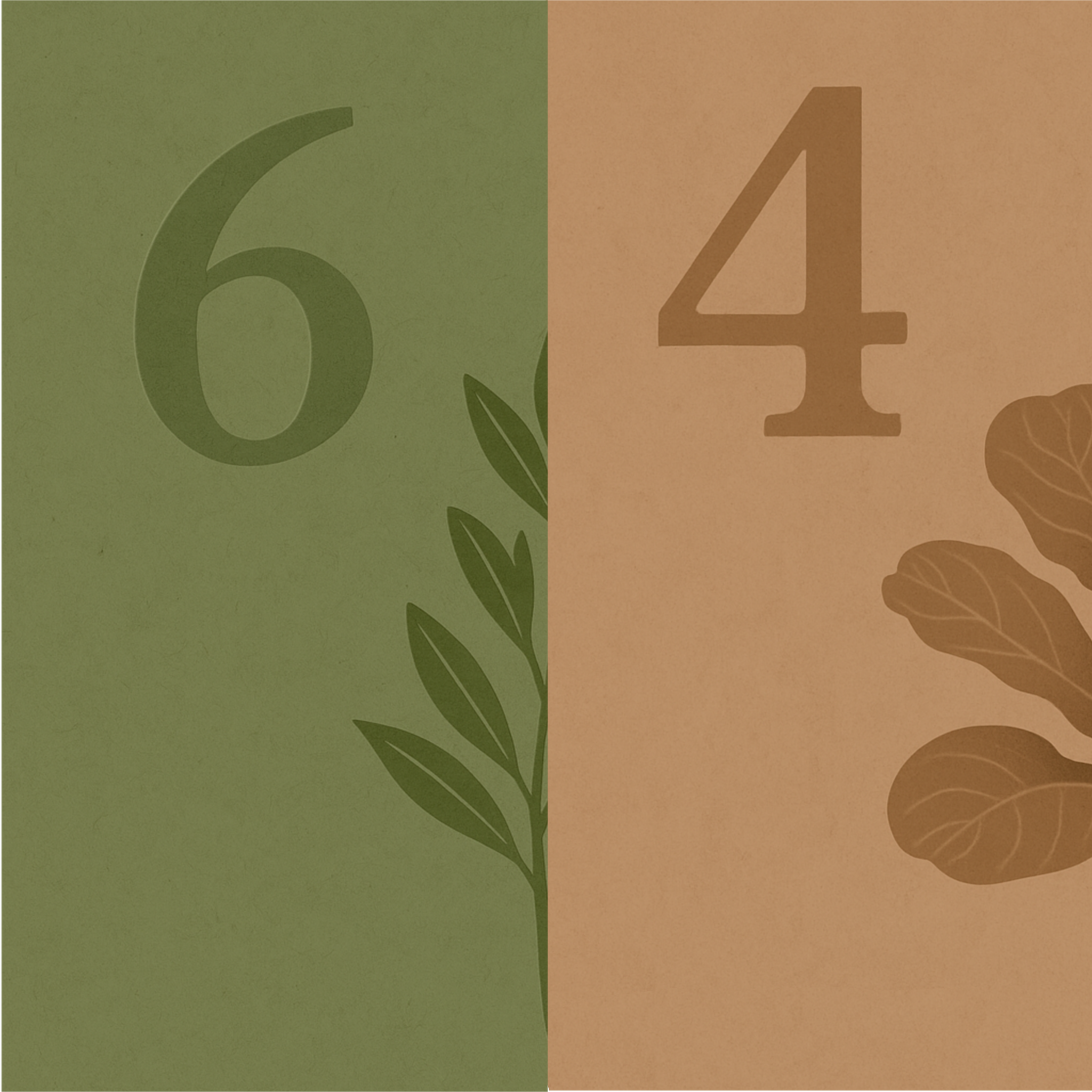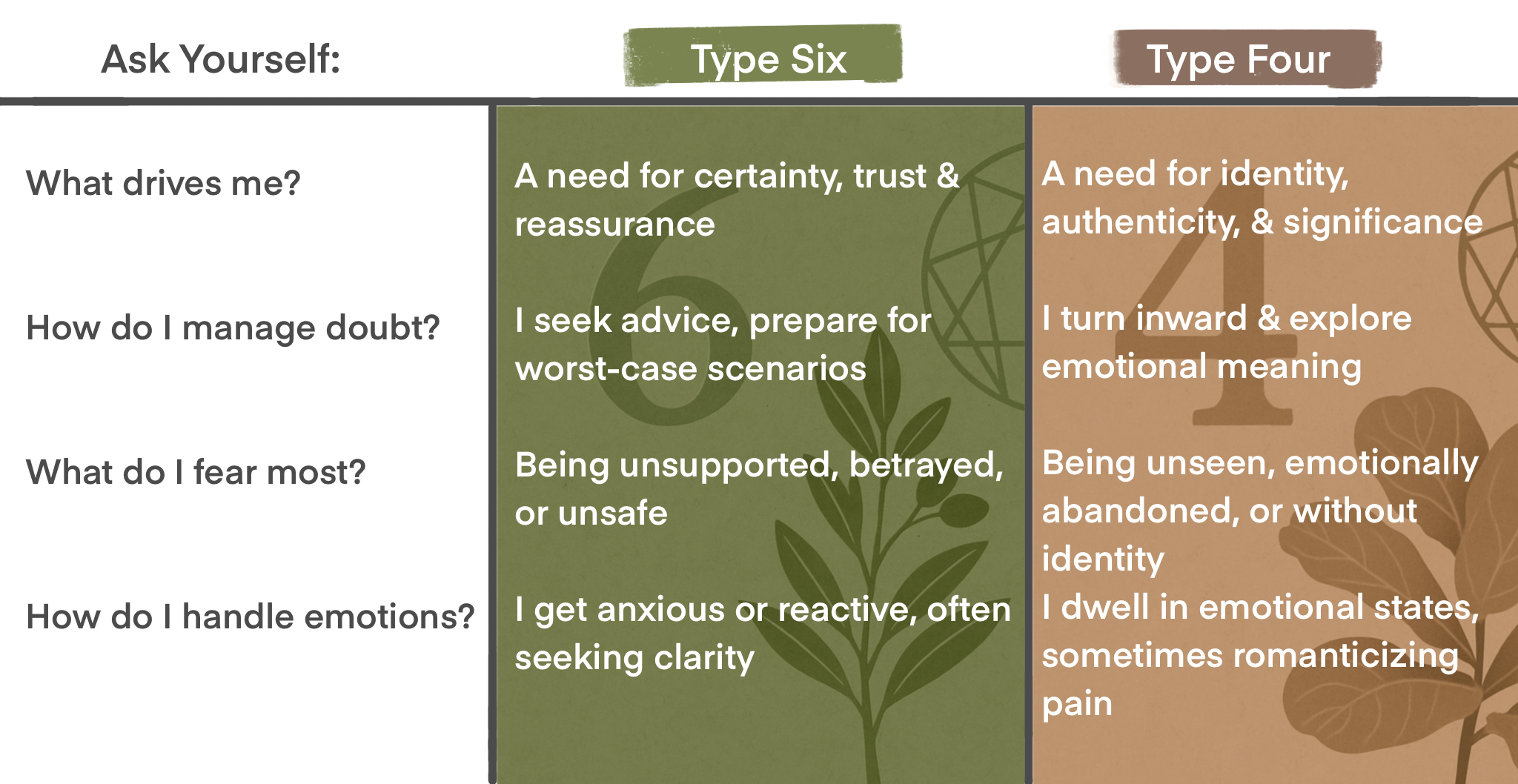In-Depth Comparison
Sixes and Fours both wrestle with self-doubt and emotional intensity, which can make them look similar on the surface. Both may be moody, withdrawn at times, or preoccupied with inner uncertainty. But their internal motivations take them in very different directions.
Type Sixes are loyal guardians. They long for support, trust, and a sense of stability. Their emotional reactions tend to be tied to fear, fear of losing security, of making the wrong choice, or of being abandoned by people they depend on. Their uncertainty tends to make them more vigilant, cautious, and likely to seek guidance.
Type Fours are emotional individualists. They feel things deeply and often feel fundamentally different or misunderstood. Their core struggle is around identity and significance, they want to express who they truly are, and they may even cling to emotional intensity to feel real. Fours aren’t just tolerating pain, they often romanticize or dwell in it.
Sixes are focused on finding security.
Fours are focused on finding identity.
Sixes doubt their decisions and seek guidance.
Fours doubt their worth and seek depth.
Sixes often fear abandonment or betrayal.
Fours often expect abandonment or feel destined to be misunderstood.
Sixes want to fit in with a trusted group.
Fours want to stand out and be seen as unique.
Ask yourself:
Do I worry more about being unsupported and uncertain (Six), or about being invisible and misunderstood (Four)?
Do I resist feeling too much (Six), or do I lean into it and even amplify it (Four)?
Quick Spot-the-Difference Table
Special Considerations & Deeper Theory
Different Intelligence Centers
Sixes are in the Head Center, oriented around scanning for threats, questioning authority, and securing loyalty and safety.
Fours are in the Heart Center, oriented around identity, emotional truth, and being seen as unique and authentic.
Relational Stance: Withdrawing vs Dependent
Sixes are in the Dependent Stance, seeking reassurance and connection from others, systems, or trusted authorities.
Fours are in the Withdrawing Stance, pulling inward to feel deeply, process experience, and protect their inner world.
Even when both types seem loyal, relational, or emotionally reactive:
A Six may say, “Please don’t let me down.”
A Four may say, “You can’t possibly understand me.”
Emotion and Expression
Sixes may experience strong emotions too, but often feel anxious about expressing them, fearing rejection, instability, or being “too much.”
Fours move toward emotional intensity and expressiveness. They feel comfortable in complexity and often value melancholy, longing, or beauty in their pain.
This can lead to confusion when:
A Six is expressive, emotionally charged, or highly attuned to relationship dynamics.
A Four is anxious, reactive, or seeks security in close bonds.
Wings & Subtypes Can Overlap
A 6w5 may be highly introspective, emotional, and attached to meaningful identity structures, sometimes confused with a more rational Four.
A 4w3 may present as socially engaged, outwardly emotional, and concerned with how others see them, sometimes mistyped as a relational Six.
Stress & Growth Movement Adds Subtle Clues
Sixes go to Nine in growth, becoming more relaxed, trusting, and less reactive, traits that might resemble a less anxious or more accepting Four.
Sixes go to Three in stress, becoming more image-focused, driven, and competitive, which can resemble the ambitious, relational energy of a Four with a strong Three wing.
In stress, Fours go to Two, becoming more emotionally dependent, people-pleasing, or consumed with earning love, traits that can look similar to a loyal, relational Six.
Common Mistyping Pitfalls
You might think you're a Six if you're a Four who constantly second-guesses yourself, fears abandonment, or is deeply loyal to a select few.
You might think you're a Four if you're a Six who experiences big emotional swings, has a strong sense of “outsider-ness,” or wrestles with themes of identity and meaning.
Both may say, “I feel like too much and not enough”, but Sixes mean it relationally or in terms of trust, and Fours mean it emotionally.
Reflect & Explore
Do I feel more driven by safety and trust (Six) or depth and authenticity (Four)?
Do I seek clarity and reassurance (Six) or meaning and intensity (Four)?
Do I want to blend in with the people I trust (Six) or stand out as uniquely myself (Four)?

